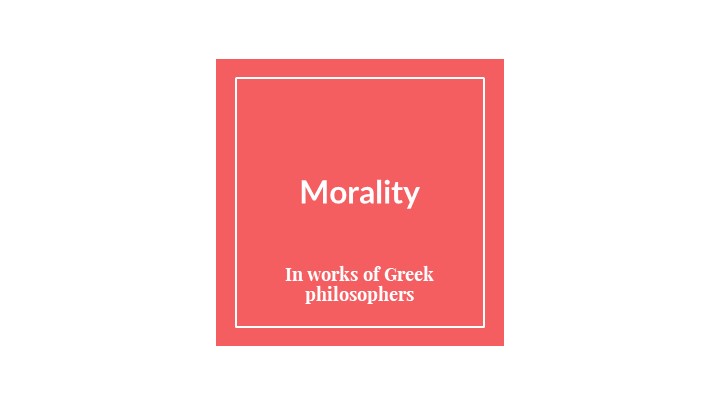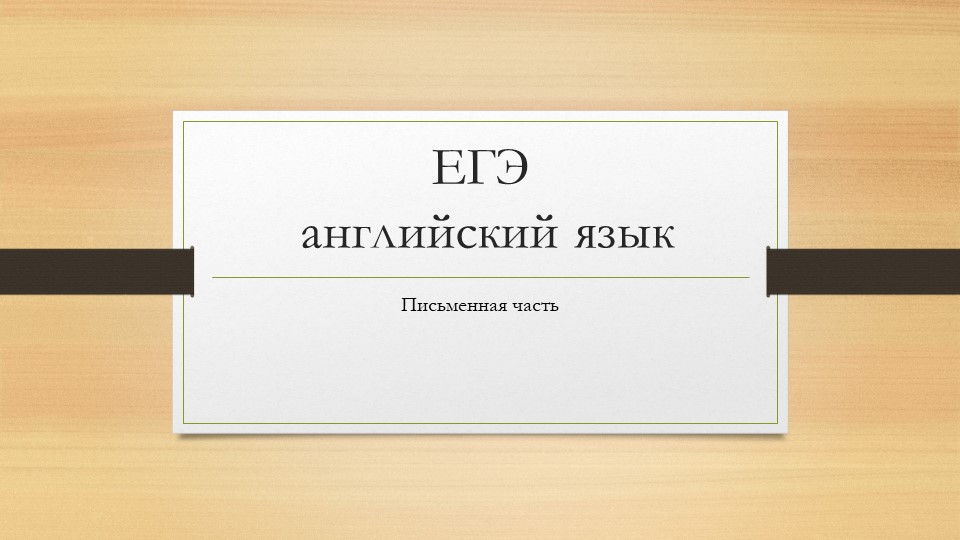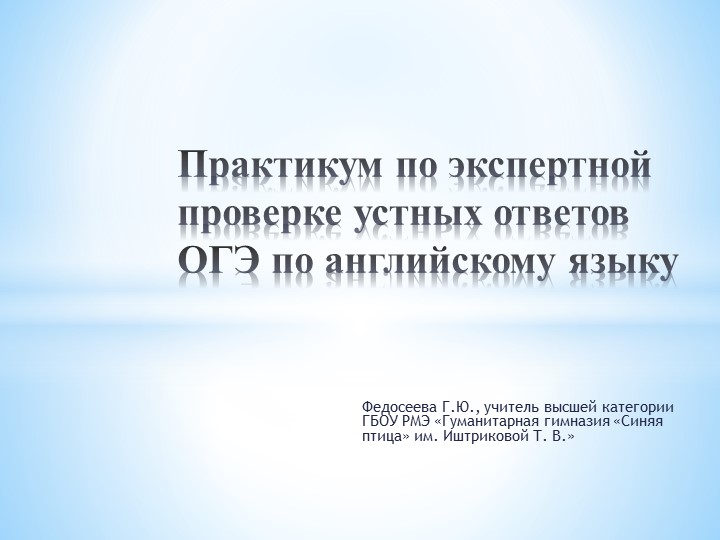Презентация - "Презентация по английскому языку на тему "Morality""

- Презентации / Другие презентации
- 6
- 22.08.23
Просмотреть и скачать презентацию на тему "Презентация по английскому языку на тему "Morality""
Сайт klass-uchebnik.com предлагает качественные учебные материалы для школьников, родителей и учителей. Здесь можно бесплатно читать и скачивать современные учебники, рабочие тетради, а также наглядные презентации по всем предметам школьной программы. Материалы распределены по классам и темам, что делает поиск максимально удобным. Каждое пособие отличается логичной структурой, доступной подачей материала и соответствует действующим образовательным стандартам. Благодаря простому языку, наглядным схемам и практическим заданиям, обучение становится легче и эффективнее. Учебники подойдут как для ежедневной подготовки к урокам, так и для систематического повторения перед экзаменами.
Особое внимание стоит уделить разделу с презентациями - они становятся отличным визуальным дополнением к теории, помогают лучше понять сложные темы и удерживают внимание учащихся. Такие материалы удобно использовать в классе на интерактивной доске или при самостоятельной подготовке дома. Все размещённые на платформе материалы проверены на актуальность и соответствие учебной программе. Это делает сайт надёжным помощником в образовательном процессе для всех участников: школьников, учителей и родителей. Особенно удобно, что всё доступно онлайн без регистрации и в свободном доступе.
Если вы ищете надежный источник для подготовки к урокам, контрольным и экзаменам - klass-uchebnik.com станет отличным выбором. Здесь вы найдёте всё необходимое, включая "Презентация по английскому языку на тему "Morality"", чтобы сделать обучение более организованным, интересным и результативным.
What is morality?
Morality (from Latin moralitas 'manner, character, proper behavior') is the differentiation of intentions, decisions and actions between those that are distinguished as proper (right) and those that are improper (wrong).
Morality can be a body of standards or principles derived from a code of conduct from a particular philosophy, religion or culture, or it can derive from a standard that a person believes should be universal. Morality may also be specifically synonymous with "goodness" or "rightness".
Immorality is the active opposition to morality (i.e. opposition to that which is good or right)
The development of modern morality is a process closely tied to sociocultural evolution.
Ethics = moral philosophy
Ethics is the branch of philosophy which addresses questions of morality. The word "ethics" is "commonly used interchangeably with 'morality', and sometimes it is used more narrowly to mean the moral principles of a particular tradition, group, or individual."
Virtue ethics began with Socrates, and was subsequently developed further by Plato, Aristotle, and the Stoics. Virtue ethics refers to a collection of normative ethical philosophies that place an emphasis on being rather than doing.
Virtue (Latin: virtus) is moral excellence. A virtue is a trait or quality that is deemed to be morally good and thus is valued as a foundation of principle and good moral being. In other words, it is a behavior that shows high moral standards: doing what is right and avoiding what is wrong. The opposite of virtue is vice.
The cardinal virtues are four virtues of mind and character in both classical philosophy and Christian theology. They are prudence, justice, fortitude, and temperance. They form a virtue theory of ethics. The term cardinal comes from the Latin cardo (hinge); virtues are so called because they are regarded as the basic virtues required for a virtuous life.
Socrates
Socrates (/ˈsɒkrətiːz/; Greek: Σωκράτης; c. 470–399 BC) was a Greek philosopher from Athens who is credited as the founder of Western philosophy and among the first moral philosophers of the ethical tradition of thought.
Socrates's theory of virtue states that all virtues are essentially one, since they are a form of knowledge. For Socrates, the reason a person is not good is because they lack knowledge. Since knowledge is united, virtues are united as well. Another famous dictum— "no one errs willingly"—also derives from this theory.
In Protagoras, Socrates argues for the unity of virtues using the example of courage: if someone knows what the relevant danger is, they can undertake a risk. Aristotle comments: " ... Socrates the elder thought that the end of life was knowledge of virtue, and he used to seek for the definition of justice, courage, and each of the parts of virtue, and this was a reasonable approach, since he thought that all virtues were sciences, and that as soon as one knew [for example] justice, he would be just..."
Socrates propounded a moral intellectualism which claimed nobody does bad on purpose, and to know what is good results in doing what is good; that knowledge is virtue. In the Protagoras dialogue it is argued that virtue is innate and cannot be learned.
Being good = living a good life
Socrates was one of the first Greek philosophers to encourage both scholars and the common citizen to turn their attention from the outside world to the condition of humankind. In this view, knowledge bearing on human life was placed highest, while all other knowledge was secondary. Self-knowledge was considered necessary for success and inherently an essential good.
A self-aware person will act completely within his capabilities to his pinnacle, while an ignorant person will flounder and encounter difficulty. To Socrates, a person must become aware of every fact (and its context) relevant to his existence, if he wishes to attain self-knowledge. He posited that people will naturally do what is good if they know what is right. Evil or bad actions are the results of ignorance. If a criminal was truly aware of the intellectual and spiritual consequences of his or her actions, he or she would neither commit nor even consider committing those actions. Any person who knows what is truly right will automatically do it, according to Socrates. While he correlated knowledge with virtue, he similarly equated virtue with joy. The truly wise man will know what is right, do what is good, and therefore be happy.
Socrates presents the famous Euthyphro dilemma in the dialogue of the same name: "Is the pious (τὸ ὅσιον) loved by the gods because it is pious, or is it pious because it is loved by the gods?"
Plato
Plato (/ˈpleɪtoʊ/ PLAY-toe; Greek: Πλάτων Plátōn; 428/427 or 424/423 – 348/347 BC) was a Greek philosopher born in Athens during the Classical period in Ancient Greece. He founded the Platonist school of thought and the Academy, the first institution of higher learning on the European continent.
Along with his teacher, Socrates, and his student, Aristotle, Plato is a central figure in the history of Ancient Greek philosophy and the Western and Middle Eastern philosophies descended from it.
Plato views "The Good" as the supreme Form, somehow existing even "beyond being".
According to Plato, there are three parts of the soul, each with its own object of desire.
Reason desires truth and the good of the whole individual, spirit is preoccupied with honour and competitive values, and appetite has the traditional low tastes for food, drink, and other physical pleasure. Because the soul is complex, erroneous calculation is not the only way it can go wrong. The three parts can pull in different directions, and the low element, in a soul in which it is overdeveloped, can win out. Correspondingly, the good condition of the soul involves more than just cognitive excellence.
The healthy or just soul has psychic harmony—the condition in which each of the three parts does its job properly. Thus, reason understands the Good in general and desires the actual good of the individual, and the other two parts of the soul desire what it is good for them to desire, so that spirit and appetite are activated by things that are healthy and proper.
Aristotle
Aristotle (/ˈærɪstɒtəl/; Greek: Ἀριστοτέλης Aristotélēs, pronounced [aristotélɛːs]; 384–322 BC) was a Greek philosopher and polymath during the Classical period in Ancient Greece. Taught by Plato, he was the founder of the Peripatetic school of philosophy within the Lyceum and the wider Aristotelian tradition. His writings cover many subjects including physics, biology, zoology, metaphysics, logic, ethics, aesthetics, poetry, theatre, music, rhetoric, psychology, linguistics, economics, politics, meteorology, geology, and government.
In Aristotle's view, when a person acts in accordance with virtue this person will do good and be content. Unhappiness and frustration are caused by doing wrong, leading to failed goals and a poor life. Therefore, it is imperative for people to act in accordance with virtue, which is only attainable by the practice of the virtues in order to be content and complete. Happiness was held to be the ultimate goal. All other things, such as civic life or wealth, were only made worthwhile and of benefit when employed in the practice of the virtues. The practice of the virtues is the surest path to happiness.
Do the right thing, in the right way, at the right time, for the right reason
Aristotle asserted that the soul of man had three natures: body (physical/metabolism), animal (emotional/appetite), and rational (mental/conceptual). Physical nature can be assuaged through exercise and care; emotional nature through indulgence of instinct and urges; and mental nature through human reason and developed potential. Rational development was considered the most important, as essential to philosophical self-awareness, and as uniquely human. Moderation was encouraged, with the extremes seen as degraded and immoral. For example, courage is the moderate virtue between the extremes of cowardice and recklessness. Man should not simply live, but live well with conduct governed by virtue. This is regarded as difficult, as virtue denotes doing the right thing, in the right way, at the right time, for the right reason.
Match the words
vice morality conduct prudence virtue ethics deemed dictum fortitude temperance propound on purpose innate inherently pinnacle f lounder attain consequences equate pious erroneous properly polymath assuage indulgence urge self-awareness uniquely moderate recklessness
умеренность. вершина ошибочный врожденный нравственность сила духа барахтаться должным образом добродетель намеренно рассматриваемый порок изречение успокоить приравнивать достигать по существу выдвигать предусмотрительность последствия мораль умеренный самосознание эрудит благочестивый поведение однозначно желание безрассудство снисхождение
Answer the questions
What are the four cardinal virtues?
Who presents the famous Euthyphro dilemma? What is its gist?
What is the main characteristic of the healthy or just soul according to Plato?
What are unhappiness and frustration caused by according to Aristotle?
What is the ultimate goal of a man according to Aristotle?
Write a letter. In your letter answer three questions
What qualities should a moral person have in your opinion?
Can an immoral man be happy? Why?
What would you recommend to your friend who wants to live a happy life?







![Aristotle<br>Aristotle (/ˈærɪstɒtəl/; Greek: Ἀριστοτέλης Aristotélēs, pronounced [aristotélɛːs]; 384 Aristotle<br>Aristotle (/ˈærɪstɒtəl/; Greek: Ἀριστοτέλης Aristotélēs, pronounced [aristotélɛːs]; 384](https://vvoqhuz9dcid9zx9.redirectto.cc/s11/1/0/4/0/3/4/8.jpg)






